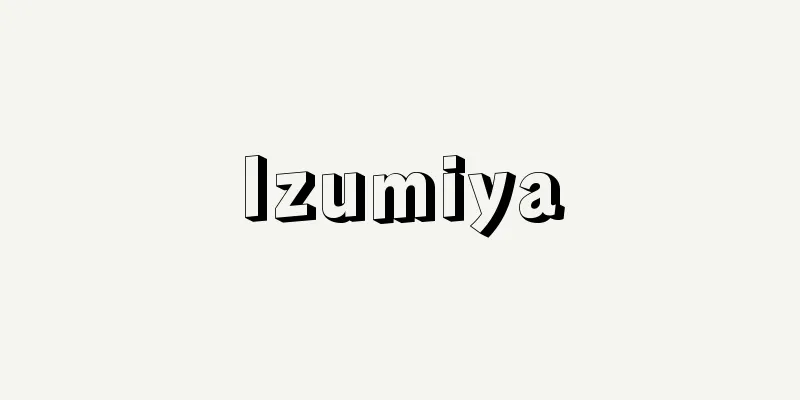Izumiya

|
...the predecessor of the Sumitomo zaibatsu. The Sumitomo family was founded by the second generation Tomomochi as a copper merchant called Izumiya in Kyoto, and from the 1620s based in Osaka, solidifying the foundations of the family business of copper refining and export, and importing foreign goods. During the reign of the third generation Tomonobu and the fourth generation Tomoyoshi, the family operated various copper mines, established branches in Edo and Nagasaki, and expanded into the money exchange and foreign currency business, reaching a period of prosperity. They also owned dozens of houses and properties as collateral for their businesses, and managed fields such as Yamamoto Shinden, which received an influx of pawned land. At the end of the Edo period, they developed new fields for rice near the Besshi copper mine. ... From Japan-Korea Trade…In addition, the export price was set at 100,000 jin from around the 13th year of the Shōtoku era, and Tsushima Domain attempted to increase it, citing the minting of Korean coins. Copper was designated as an export item not only for private trade but also for public trade, and as it was designated as rough copper (refined at the mine), in order to ensure a consistent quality, they purchased it exclusively from Fukiya Izumiya Kichizaemon (Sumitomo family) in Osaka. Izumiya was also the manager of the powerful Besshi copper mine at the time, and the Besshi rough copper designated for public trade was especially known as Kanpindo (quality copper), and was widely used for minting Korean coins, weapons, copperware, plates, Buddhist altar implements, etc. … From [Besshi Copper Mine] ...This type of deposit is called the Besshi type copper deposit, and is represented by the mines known in the Sanbagawa crystalline schist group, such as Kune (Shizuoka Prefecture), Sazare, Ookuki (Ehime Prefecture), and Shirataki (Kochi Prefecture). [Umetaro Yamaguchi] *Some of the terminology that mentions "Izumiya" is listed below. Source | Heibonsha World Encyclopedia 2nd Edition | Information |
|
…住友財閥の前身。住友家は,2代友以(とももち)が京都で銅商泉屋を興し,1620年代から大坂を本拠として銅の精錬・輸出と外国品の輸入という家業の基礎を固め,3代友信,4代友芳の時代に諸銅山の稼行,江戸・長崎出店の設置,両替・為替業へ進出して,隆盛期を迎えた。また事業上の担保として家屋敷数十ヵ所を所有するとともに質地の流れ込んだ山本新田などの田畑を経営し,幕末には別子銅山の近辺で飯米用の新田を開発した。… 【日朝貿易】より…そのうえ,13年(正徳3)ごろより輸出定額を10万斤とされたため,対馬藩は朝鮮国の鋳銭を理由に増額をはかった。銅は,私貿易だけでなく公貿易の輸出定品とされており,それも荒銅(山元で精錬したもの)があてられていたことから,品質一定のため,大坂の吹屋泉屋吉左衛門(住友家)から一手に買い付けていた。泉屋は当時有力な別子銅山の経営者でもあり,公貿易に指定された別子荒銅はとくに看品銅(かんぴんどう)と称され,朝鮮の鋳銭原料や兵器,銅器皿,仏具などに広く用いられた。… 【別子銅山】より…久根(くね)(静岡県),佐々連(さざれ),大久喜(おおくき)(以上愛媛県),白滝(しらたき)(高知県)など三波川結晶片岩類中に知られる諸鉱山を代表して,この型の鉱床は別子型銅鉱床と呼ばれる。【山口 梅太郎】 ※「泉屋」について言及している用語解説の一部を掲載しています。 出典|株式会社平凡社世界大百科事典 第2版について | 情報 |
<<: Izumiya Kanjuro - Izumiya Kanjuro
Recommend
"Revised Tengen Guide" - Kaisei Tengenshinan
…With Arima's support, he published Seiyo San...
Iwatsuki Domain
This Fudai clan had its headquarters in Iwatsuki,...
Yoshigo Shell Mound
This shell mound is from the late Jomon period an...
Laodicea (Syria) (English spelling) Laodicea
...Population: 303,000 (1994). The origins of the...
Sitka (English spelling)
A city on the west coast of Baranov Island in the...
Cinchona - Cinchona
A general term for evergreen tall trees of the Ci...
Hattori Nakatsune - Hattori Nakatsune
Year of death: March 14, 1824 (April 13, 1824) Yea...
Chuzan Seikan - Chuzan Seikan
This is the official history of the Ryukyu Kingdo...
montaña (English spelling) montana
…From the colonial period to the present day, Ind...
Hoffmann, R.
…In 1949, he returned to Essen and was appointed ...
Koshikake teahouse - Koshikakejaya
〘 noun 〙① A simple teahouse with a reed mat shed o...
Nagatoki Ogasawara - Nagatoki Ogasawara
A military commander in the Sengoku period. He wa...
Longinus (English spelling)
A Roman centurion and martyr in Christian legend. ...
Aokata Ietaka - Aokata Ietaka
...A powerful clan in the Middle Ages based in Ao...
Square tomb - Houfun
A kofun (tumulus) with a square-shaped mound in p...









